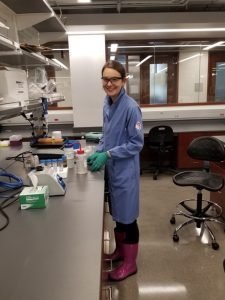Nanotechnology at Northwestern
Meet Stephanie Ribet, a PhD student in the Dravid Group
September 14, 2020
Stephanie Ribet is a third-year graduate student in the Dravid Group, which investigates atomic and nanoscale phenomena in advanced materials.

Where are you originally from?
Berkeley, California.
Where did you complete your undergraduate degree?
I graduated from Princeton in 2016, where I majored in chemistry and minored in materials science and engineering.
What year are you now?
I am beginning my third year in the materials science and engineering program.
When did you first become interested in engineering?
Between college and graduate school, I spent two years working as a chemist at Sakti3 on developing solid state batteries. It was rewarding to apply my chemistry background to a technology problem that I am passionate about. Working on exciting engineering challenges made it clear to me that I should apply to graduate programs in materials science and engineering.
How do you explain what you study to non-scientists?
I work on creating new materials for removing and recovering pollutants from water. My research focus is on understanding the basic scientific principles that contribute to the functionality of these emerging technologies.
You’re currently doing research into the problem of phosphate recovery. What drew you to that subject, and what do you hope to achieve?
It’s no secret that the Great Lakes Region suffers from a number of clean drinking water and water pollution issues, including hypereutrophication, the release of excess nutrients into natural bodies of water, creating large algae blooms. Living in the Midwest since 2016 has heightened my interest in these water problems, augmenting my excitement to focus on environmental remediation during my graduate degree.
The Dravid Group recently reported the Oleophilic, Hydrophobic, Magnetic (OHM) sponge, a novel nanocomposite material that can adsorb 20-35 times its weight in oil for many cycles. Using our OHM sponge as a platform technology, we aim to develop new strategies to remove phosphates from water before they contribute to algae blooms. Moreover, we want to not only remove nutrients but also recover them, which is important for phosphate, as it is a non-renewable natural resource of limited supply.
What has been a highlight of your time at Northwestern?
I am lucky to work with a group of incredibly smart, talented and fun colleagues in the Dravid Group and at the NUANCE Center. Spending time with these researchers in both a technical and a non-technical setting has been the highlight of my graduate experience.
What has been the most challenging aspect of your work or your time here?
I feel like I am facing a constantly evolving set of challenges in my PhD. Recently, the pandemic has introduced new hurdles, as I’ve tried to figure out how to continue my lab-based research in a remote or semi-remote manner. I am sure there will be many more challenges ahead, and I am grateful to have a strong community to help me along the way.
Can you tell me about your experiences either being mentored or mentoring others?
I have had a number of amazing mentors who have inspired me to stay in the field and taught me fundamental skills I need to succeed. As I strive to provide similar experiences for younger students, I have experienced first-hand just how challenging it is to guide and educate others.
I am a Science Club mentor, where I go weekly to the MetaMedia center at the YMCA to work on experiments with middle school students in the area. I’ve learned some helpful techniques at Science Club; for example, keeping my gloves off while mentoring removes temptation to step in and help students, allowing them the space they need to solve problems themselves.
What are your hobbies outside of the lab?
When I am not in lab, you can find me on an “essential” trip to a local coffee shop or running along the lakefront. I am enjoying the NBA bubble restart, despite the absence of my hometown superstar, Steph Curry.